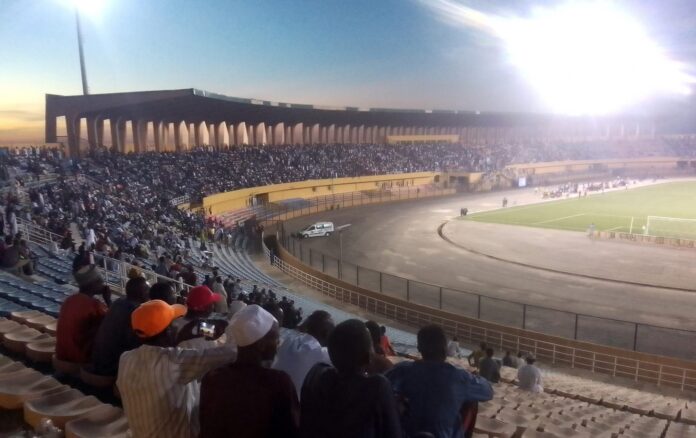Why Northern Nigeria’s Football Heartbeat Thrives From Kano to Gombe—But Reaches Its Fullest Glory in Katsina
By:Abdullahi Inuwa
There are stadiums, and then there is the Muhammadu Dikko Stadium in Katsina—a towering symbol of unity, passion, and a football culture so intense that it defies comparison. From the moment you step through its gates, the atmosphere hits you with a force that even the most seasoned football lovers struggle to describe. The drums, the chants, the collective heartbeat of thousands—it is an energy that rises like a wave and pulls you into a world where football is not just a game but an identity.
Across northern Nigeria, from Kano to Gombe, football is celebrated with genuine affection. These cities have produced legendary clubs, iconic players, and fanbases that stand proudly behind their teams. But even within this rich football axis, one venue stands above the rest. The Muhammadu Dikko Stadium is not merely a sporting arena; it is the cathedral of northern football, the unmatched home of passion where the game comes alive in its purest form.
Football in Katsina is not a weekend hobby—it is cultural DNA. Here, the sport carries an emotion that binds entire communities. Matchdays transform the city. Streets empty as fans in jerseys, scarves, and traditional attire march toward the stadium like pilgrims heading for a sacred gathering.
Inside, the stands are transformed into a living ocean of color and sound. Boys drum with the energy of warriors. Women sing with voices that rise above the noise. Elders nod proudly, recounting stories of decades of football glory. Every tribe, every community, every age group is represented—united by a devotion that cannot be faked or replicated.
“The game is in our blood,” says a supporter who has attended nearly every match for 20 years. “Here, football is not entertainment. It is who we are.”
That identity spreads far beyond Katsina. From Kano’s passionate Kano Pillars supporters to Gombe’s dedicated fans, northern Nigeria carries a football spirit unmatched in its warmth, loyalty, and emotional depth. But even they admit—Katsina’s stadium atmosphere is something different. Something special. Something legendary.
When a match is underway, the Muhammadu Dikko Stadium becomes a volcano of sound. The roar is deafening. The chants are rhythmic and endless. The excitement is contagious—even visiting teams confess they often feel overwhelmed before kickoff.
Players, too, feel the energy. Many have said that stepping onto the Katsina pitch for the first time is like stepping into a different world entirely—one where every pass, every tackle, every shot is amplified by thousands of beating hearts. It is a psychological weapon, a home advantage unlike any other in Nigeria.
And then there are the unforgettable nights—the ones etched in the memory of every fan lucky enough to witness them. Nights when the stadium lights glow like stars, when the tension is thick enough to hold in your hands, and when a single goal sends the entire city into a frenzy. These are the moments that define Katsina football, moments that remind spectators why they return again and again.
The Muhammadu Dikko Stadium is more than concrete and steel; it is a symbol of pride, unity, and shared history. Named after Sir Muhammadu Dikko, the 47th Emir of Katsina, the stadium represents leadership, heritage, and continuity.
Its architecture blends modernity with cultural identity, and its spacious stands welcome fans from across Nigeria. Children who once watched from the upper chairs now bring their own children. Families treat matchdays like celebrations. For many, the stadium is not just a place but a memory book—filled with laughter, heartbreak, triumph, and togetherness.
Football legend in the region was not built overnight. Kano brought the fierce competitive spirit, Gombe added finesse and passion, and Katsina cemented the culture with unwavering devotion. Together, they form a football triangle unlike any other in the country.
But ask any neutral football lover who has traveled across these stadiums, and most will tell you the same thing:
Katsina is different.
What sets it apart is not size, nor history alone, but the raw emotion that fills the air. It is the unity of the crowd, the unfiltered love for the game, and the energy that refuses to fade—not even in defeat.
The magic of Muhammadu Dikko Stadium cannot be exported. It cannot be recreated in any other venue, no matter how modern or well-built. It lives in the voices of the fans, the rhythm of the drums, the harmony of tradition and sport.
It is the way young boys mimic their heroes in the streets after the match.
It is the way elders discuss tactics as though they were seasoned managers.
It is the way entire communities erupt in celebration when their team triumphs.
No other stadium captures this blend of culture, sport, and community spirit as intensely or as beautifully.
For many, visiting the Muhammadu Dikko Stadium is not just a football outing—it is a life experience. It is where strangers become brothers, where a win feels like victory for the entire city, and where a loss is mourned collectively.
This is what happens only in Katsina.
This is what the stadium has come to represent.
This is why, from Kano to Gombe, the football culture is celebrated—but reaches its peak in Katsina.
In a world where football often feels commercialized and distant, Katsina has preserved its soul. And in doing so, it has given Nigeria a gift—a stadium where passion still rules, where community still matters, and where the beautiful game is still truly beautiful.
Abdullahi Inuwa Social Commentator ainuwa303@gmail.com




